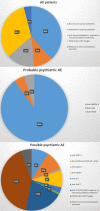Clinical manifestations and immunomodulatory treatment experiences in psychiatric patients with suspected autoimmune encephalitis: a case series of 91 patients from Germany
- PMID: 35046526
- PMCID: PMC9095476
- DOI: 10.1038/s41380-021-01396-4
Clinical manifestations and immunomodulatory treatment experiences in psychiatric patients with suspected autoimmune encephalitis: a case series of 91 patients from Germany
Abstract
Autoimmune encephalitis (AE) can rarely manifest as a predominantly psychiatric syndrome without overt neurological symptoms. This study's aim was to characterize psychiatric patients with AE; therefore, anonymized data on patients with suspected AE with predominantly or isolated psychiatric syndromes were retrospectively collected. Patients with readily detectable neurological symptoms suggestive of AE (e.g., epileptic seizures) were excluded. Patients were classified as "probable psychiatric AE (pAE)," if well-characterized neuronal IgG autoantibodies were detected or "possible pAE" (e.g., with detection of nonclassical neuronal autoantibodies or compatible cerebrospinal fluid (CSF) changes). Of the 91 patients included, 21 (23%) fulfilled our criteria for probable (autoantibody-defined) pAE and 70 (77%) those for possible pAE. Among patients with probable pAE, 90% had anti-NMDA receptor (NMDA-R) autoantibodies. Overall, most patients suffered from paranoid-hallucinatory syndromes (53%). Patients with probable pAE suffered more often from disorientation (p < 0.001) and impaired memory (p = 0.001) than patients with possible pAE. Immunotherapies were performed in 69% of all cases, mostly with high-dose corticosteroids. Altogether, 93% of the patients with probable pAE and 80% of patients with possible pAE reportedly benefited from immunotherapies (p = 0.251). In summary, this explorative, cross-sectional evaluation confirms that autoantibody-associated AE syndromes can predominantly manifest as psychiatric syndromes, especially in anti-NMDA-R encephalitis. However, in three out of four patients, diagnosis of possible pAE was based on nonspecific findings (e.g., slight CSF pleocytosis), and well-characterized neuronal autoantibodies were absent. As such, the spectrum of psychiatric syndromes potentially responding to immunotherapies seems not to be limited to currently known autoantibody-associated AE. Further trials are needed.
© 2022. The Author(s).
Conflict of interest statement
AH: is editor of the German and WFBSP guidelines schizophrenia. He has been invited to scientific meetings by Lundbeck, Janssen, and Pfizer, and he received paid speakerships from Desitin, Janssen, Otsuka, and Lundbeck. He was member of Roche, Otsuka, Lundbeck, and Janssen advisory boards. MK: lecture fees or travel grants within the last 3 years: Haema, Janssen-Cilag, Servier. JL: received speaker fees or travel compensation from UCB, Bayer, Roche, Teva and the Cure Huntington’s Disease Initiative (CHDI). His institution has been reimbursed for his role as a principal investigator in trials for UCB and CHDI. His research is funded by the European Huntington’s Disease Initiative and Ministry for Education and Research Baden-Württemberg outside the submitted work, as well as the German Ministry for Education and Research (BMBF). He works for an academic institution, which also offers commercial antibody testing. YY: has been supported by travel grants from Novartis and Sanofi Genzyme, has received an honorarium for active participation in an advisory board by Sanofi Genzyme as well as speaking honoraria by Roche and Sanofi Genzyme. FvP: has received fees as speaker or consultant from Bial, Desitin, Eisai, GW Pharma, Arvelle, and UCB Pharma. AP: has served on advisory boards, given lectures, performed phase 3 studies, or received travel grants within the last 3 years from Boehringer, Janssen-Cilag, MEDICE Arzneimittel Putter GmbH and Co KG, and Shire/Takeda and has authored books and articles on ADHD published by Elsevier, Hogrefe, Schattauer, Kohlhammer, Karger, Springer, Thieme, and Oxford University Press. KD: Steering Committee Neurosciences, Janssen. AN: has received lecture fees from Novartis. FL: consulting activities/lecture fees for/from Biogen, Grifols, Teva, Roche, Merck, Fresenius. LTvE: advisory boards, lectures, or travel grants within the last 3 years: Roche, Eli Lilly, Janssen-Cilag, Novartis, Shire, UCB, GSK, Servier, Janssen and Cyberonics. Other authors declare no competing interests.
Figures


Comment in
-
Challenging the psychiatry-neurology divide: the case of autoimmune encephalitis.Nat Rev Neurol. 2022 May;18(5):253-254. doi: 10.1038/s41582-022-00636-7. Nat Rev Neurol. 2022. PMID: 35236924 No abstract available.
References
Publication types
MeSH terms
Substances
Supplementary concepts
LinkOut - more resources
Full Text Sources
Research Materials

